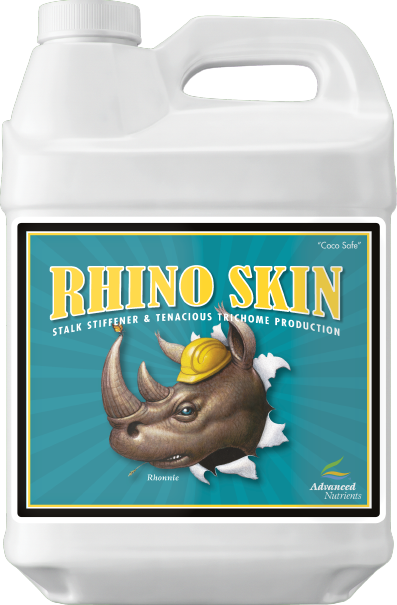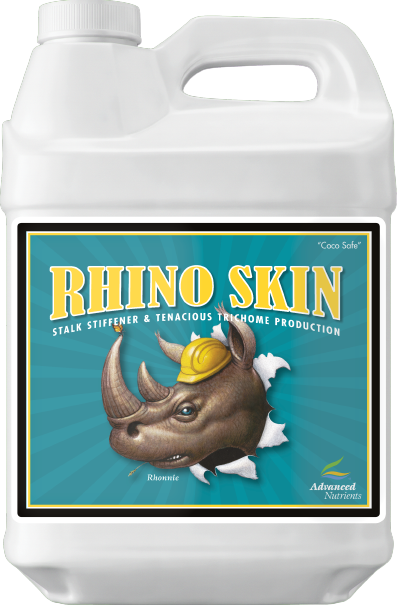Advanced Nutrients
Advanced Nutrients Rhino Skin
Advanced Nutrients Rhino Skin
Low stock: 8 left
Couldn't load pickup availability
Payment options
- Fast Delivery
- Easy Returns
- Secure Checkout
Description
Description
Advanced Nutrients Rhino Skin is a premium silicon supplement designed to enhance the structural integrity and resilience of your plants. This high-quality product contains a specialized form of silicon, which fortifies plant cell walls, making them stronger and more resistant to environmental stressors. By incorporating Rhino Skin into your feeding regimen, you can promote healthier and more robust plants that are better equipped to handle adverse conditions and produce higher yields.
Key Features:
Reinforced Cell Walls: Rhino Skin is enriched with a unique form of silicon that plants readily absorb. This silicon strengthens the cell walls, making them thicker and more rigid, thus providing mechanical support to the plant's structure.
Disease and Pest Resistance: Plants with reinforced cell walls are less susceptible to attacks from pests and pathogens. This can help protect your crops from common issues like powdery mildew and spider mites.
Increased Tolerance to Environmental Stress: Rhino Skin aids plants in dealing with stressors such as extreme temperatures, drought, and physical damage. It acts as a shield, enabling the plant to better withstand adverse conditions.
Improved Nutrient Uptake: With stronger cell walls, plants are better equipped to absorb and transport nutrients efficiently, which can lead to healthier, more vigorous growth.
Enhanced Yields: By promoting healthier and more resilient plants, Rhino Skin can contribute to increased yields and improved crop quality.
Suitable for Various Growth Mediums: Rhino Skin is versatile and can be used in different cultivation systems, including soil, hydroponics, and soilless mediums.
Usage Instructions:
Dilution: Mix the recommended dosage of Rhino Skin with water. Refer to the product label for precise instructions.
Feeding Schedule: Include Rhino Skin in your regular feeding regimen, ensuring even coverage and distribution throughout your plants' life cycle.
Consistency: For optimal results, use Rhino Skin consistently, from the vegetative growth stage through flowering.
Observation: Monitor your plants for improvements in structure, stress tolerance, and overall health. Adjust the dosage if necessary.
Advanced Nutrients Rhino Skin is a valuable addition to any grower's toolkit, especially for those seeking to maximize plant strength and resistance. By strengthening cell walls and improving the overall health of your plants, this silicon supplement helps prevent damage, boost nutrient uptake, and ultimately increase your yields. Integrate Rhino Skin into your cultivation practices to provide your plants with the support they need to thrive, even under challenging conditions.
Share

INFORMATION QUESTIONS
FREQUENTLY ASKED QUESTIONS
What is Hydroponics?
Hydroponics is the science of growing plants without soil. The plants thrive on the nutrient-water solution alone. The growing medium merely acts as a support for the plants and their root systems while the solution passes freely. The growing medium, if any, is totally inert.
What types of plants grow best hydroponically?
Anything can be grown hydroponically, but some plants prove to be more space efficient. Some plants we suggest are tomatoes, sweet peppers, hot chilies, lettuce, spinach, squash, cucumbers, broccoli, beans, snow peas, herbs and flowers of all types.
Can you REALLY get better yields/quicker growth?
Absolutely. The plants, when receiving everything they need, tend to be healthier, faster growing and generally more productive. You can expect 30% faster growth with many crops.
What are the watering cycle timelines hydroponic systems?
Once the reservoir is filled with nutrients, it is time to put your hydro system to work! The ease of hydroponics is automation – automation is achieved by putting the pump on a timer according to your watering needs. The watering cycle depends on growth stage, growing medium and hydroponic system. In an ebb and flow or drip system with rockwool as the medium, seedlings, clones and plants in the early vegetative stage require watering only once a day for 15-30 minutes (twice a day for higher temps). Mature, flowering and fruiting plants require a heavier feed and can be fed once a day for 30 minutes (twice a day for higher temps). Typically soiless mixes and coco fiber can be watered for about 15 minutes twice a day, and can be adjusted for heavier feeding during the flowering and fruiting stage or higher temps. ViaStone, Hydroton, Grow Rocks, and Silicate mediums need to be watered more frequently – a constant drip for drip systems, and about 15-30 minutes every 3 hours for ebb and flow systems and can be adjusted for heavier feeding during the flowering and fruiting stage or higher temps. Aeroponic systems require frequent watering cycles; 30-60 seconds every few minutes or a constant spray.
What do I need to test pH? How do I test pH?
pH has a range from 0 (acidic) – 14 (alkaline), with 7 being neutral. A proper hydroponic pH range is between 5.5 to 6.2 for most hydroponic crops. For specific crop pH, check out our Plant Guide. pH must remain within the proper range for good plant health, disease resistance, and proper nutrient uptake. pH is maintained by adding pH Up and pH Down to the nutrient solution. For more information, see the Testssection of our site.
How will the flavor compare to my outdoor grown, organic produce?
The taste may be even better! This is simply due to the fact that the hydroponically grown plants are getting everything they need, when they need it. Don’t be fooled by “hot house” produce grown commercially. The grower’s primary concern is shipability and storage, not flavor. When you grow your own vegetables at home, you can expect nothing less than excellent results. Plus, hydroponically grown produce has the added benefit of a longer shelf life.

